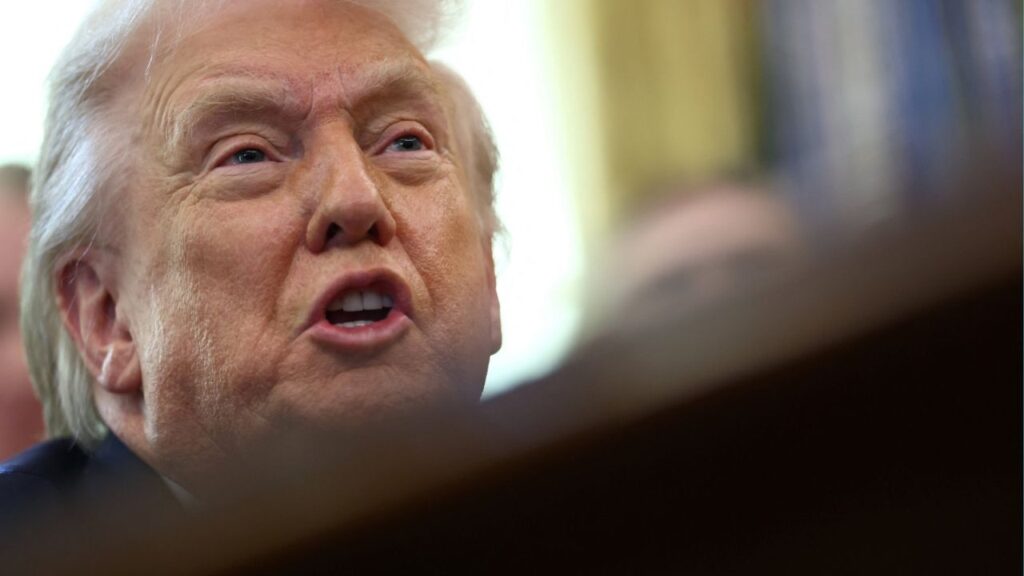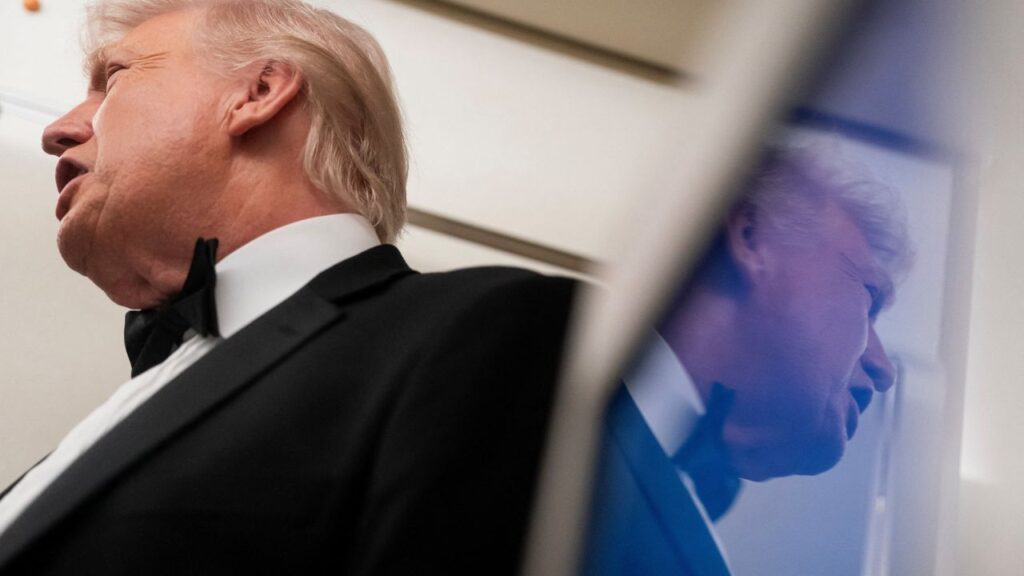Share
The latest developments on the Russia-Ukraine war
KYIV, Ukraine — A Russian attack severely damaged a maternity hospital in the besieged port city of Mariupol, Ukraine said Wednesday, and citizens trying to escape shelling on the outskirts of Kyiv streamed toward the capital amid warnings from the West that Moscow’s invasion is about to take a more brutal and indiscriminate turn.
President Volodymyr Zelenskyy wrote on Twitter that there were “people, children under the wreckage” of the hospital and called the strike an “atrocity.” Authorities said they were trying to establish how many people had been killed or wounded. At least 17 people reportedly were injured.
Video shared by Zelenskyy showed cheerfully painted hallways strewn with twisted metal and room after room with blown-out windows. Floors were covered in wreckage.
Outside, mangled cars burned, in a video provided by the Mariupol city council, with heavy damage to at least three two-story buildings. Much of the front of one building had been ripped away. The council said the damage was “colossal.”
“There are few things more depraved than targeting the vulnerable and defenseless,” British Prime Minister Boris Johnson tweeted, adding that Russian President Vladimir Putin will be held “to account for his terrible crimes.”
Ukrainians Buried in Mass Grave
MARIUPOL, Ukraine — City authorities in the besieged southern Ukrainian port city of Mariupol are burying their dead in a mass grave.
With the city under steady bombardment, officials had been waiting for a chance to allow individual burials to resume. But with morgues overflowing, and many corpses uncollected at home, they decided they had to take action.
A deep trench some 25 meters long has been opened in one of the city’s old cemeteries in the heart of the city. Social workers brought 30 bodies wrapped in carpets or bags Wednesday, and 40 were brought Tuesday.
The dead include civilian victims of shelling on the city as well as some soldiers. Workers with the municipal social services have also been collecting bodies from homes, including some civilians who died of disease or natural causes.
No mourners were present, no families said their goodbyes.
Russia Admits to Using Conscript Soldiers
NEW YORK — Russia has admitted that conscript soldiers have been sent into Ukraine and that some have been captured by Ukrainian troops.
The admission comes after President Vladimir Putin vowed that conscripts would not be deployed and that Russian forces would rely on professional troops.
Defense Ministry spokesman Maj. Gen. Igor Konashenkov said that “unfortunately there have been detected several instances of the presence of conscript-service military personnel” with units in Ukraine but that “almost all” of them had been recalled to Russia.
He added that some conscripts were taken prisoner by Ukrainian forces while serving in a logistics unit and efforts are underway to free them. Konashenkov didn’t specify how many conscripts had served in Ukraine or how many were captured.
China Sends Humanitarian Aid, Opposes Sanctions
BEIJING — China says it is sending humanitarian aid including food and daily necessities worth 5 million yuan ($791,000) to Ukraine while continuing to oppose sanctions against Russia over its invasion.
Foreign Ministry spokesperson Zhao Lijian told reporters an initial batch was sent to the Ukrainian Red Cross on Wednesday with more to follow “as soon as possible.”
China has largely backed Russia in the conflict and Zhao reiterated Beijing’s opposition to biting economic sanctions against Moscow.
Zhao told reporters at a daily briefing that “wielding the stick of sanctions at every turn will never bring peace and security but cause serious difficulties to the economies and livelihoods of the countries concerned.”
He said China and Russia will “continue to carry out normal trade cooperation, including oil and gas trade, in the spirit of mutual respect, equality and mutual benefit.”
China has sought to blame the U.S. for instigating the conflict, citing what it calls Washington’s failure to adequately consider Russia’s “legitimate” security concerns in the face of NATO expansion.

British Official Predicts War Will Get More Brutal
LONDON — Britain’s defense minister says Russia’s military assault on Ukraine will get “more brutal and more indiscriminate” as President Vladimir Putin tries to regain momentum against fierce Ukrainian resistance.
Defence Secretary Ben Wallace told British lawmakers that Russia was seeking to use mercenaries from the Wagner Group in Ukraine, calling that a sign of “desperation.”
The Wagner Group, owned by a confidant of Putin, has been accused by Western governments and U.N. experts of human rights abuses in Africa and involvement in the conflict in Libya.
Wallace said the group was “responsible for all sorts of atrocities in Africa and the Middle East. And the fact that Russia is now trying to encourage them to take part in Ukraine, I think, is a telling sign.”
Western intelligence officials are concerned that Russia plans to use violence to terrorize the population and deter protests in areas of Ukraine under its control. A European official told the AP that Russia was considering “aggressive measures” including “violent crowd control, repressive detention of protest organizers” and even public executions.
UK Has Issued Fewer Than 1,000 Visas to Ukrainians
LONDON — Ukraine’s ambassador to Britain has urged the government to suspend visa requirements for Ukrainians fleeing the war, after the U.K. acknowledged fewer than 1,000 visas have been handed out so far.
Vadym Prystaiko told lawmakers that “if you can vote for some temporary releasing of us from these rules, to allow people to get here, we will take care of (them).”
Britain’s Conservative government says it is prepared to take in hundreds of thousands of refugees from Ukraine. But as of Wednesday the number of visas issued was just below 1,000.
European Union nations are allowing Ukrainians to live and work for up to three years without having to go through a formal asylum-seeking process. The U.K., which left the bloc last year, isn’t waiving the paperwork, saying applicants must submit biometric data for security reasons.
Ukrainians arriving at the English Channel port of Calais have been told to apply at British missions in Paris or Brussels, while others say they are waiting days for appointments at U.K. embassies in eastern Europe.
The British government says it is setting up a new visa center in Lille, northwest France, that will start work on Thursday.
Italy Will Allow Refugees to Work There
ROME — Italy will let refugees arriving from Ukraine who have applied for a residency permit to work, either for employers or in self-employment, including seasonal work.
The existing quotas for foreign workers based on nationalities will be lifted for the Ukrainians fleeing the war in their homeland, Premier Mario Draghi told lawmakers.
As of Wednesday, nearly 24,000 Ukrainians fleeing the war had arrived in Italy, mainly through the Italian border with Slovenia. Of those, 9,700 are minors.
All the refugees will be required to either be vaccinated against COVID-19 if they aren’t already or take a swab test every 48 hours. In Italy, those 5 years and older can be vaccinated against COVID-19.
In terms of integration measures, children will be able to attend Italian schools. Draghi cautioned Italians to keep in mind that measures for the refugees will be needed not for days or months but “perhaps for far longer.”
18 Documented Attacks on Health Facilities and Workers
GENEVA — The World Health Organization says it has documented 18 attacks on health facilities, workers, and ambulances since the Russian invasion of Ukraine began.
At a press briefing on Wednesday, WHO director-general Tedros Adhanom Ghebreyesus said the U.N. health agency has delivered 81 metric tons of supplies to Ukraine and is now establishing a pipeline to send further equipment. To date, Tedros said WHO had sent enough surgical supplies to treat 150 trauma patients and other supplies for a range of health conditions to treat 45,000 people.
Dr. Michael Ryan, WHO’s emergencies chief, acknowledged that sending medical supplies to Ukraine was unlikely to make a big difference.
“This is putting bandages on mortal wounds right now,” he said.
WHO chief Tedros said some of the main health challenges officials were facing in Ukraine were hypothermia and frostbite, respiratory disease, heart disease, cancer, and mental health issues. He added that WHO staffers have been sent to countries neighboring Ukraine to provide mental health support to fleeing refugees, mostly women, and children.
EU Will Help With Communications
LONDON — The European Union is working on sending communications equipment to Ukraine after the country asked Brussels for help to keep telecom networks running.
The EU “received a request from our Ukrainian friends and we’re in the process of coordinating on that,” French digital minister Cedric O said Wednesday.
The minister said EU officials discussed aid in the form of electronic and computer equipment that they could offer Ukraine to ensure the country’s telecom and administrative networks “continue as normally possible.”
He did not go into details but said it was all civilian equipment “necessary to keep an administration up and running.”
As the Russian offensive grinds on, Ukraine’s ability to maintain telecommunications in some areas is in question as cellphone networks went down in the besieged port city of Mariupol.

German Chancellor Opposes Supplying Ukraine With Fighter Jets
BERLIN — German Chancellor Olaf Scholz is indicating that he doesn’t favor supplying old MiG fighter jets to Ukraine.
Poland late Tuesday offered to give the U.S. 28 MiG-29 fighter planes for Ukraine’s use. U.S. officials said the proposal was “untenable,” but they would continue to consult with Poland and other NATO allies.
Scholz was asked Wednesday whether Germany would be prepared to allow such a delivery, and whether he feared being drawn into the conflict by a jet delivery via the United States’ Ramstein Air Base in Germany — which Poland had proposed.
Scholz noted that Germany has given Ukraine financial and humanitarian aid, as well as some weapons. He added: “otherwise, we must consider very carefully what we do in concrete terms, and that most certainly doesn’t include fighter planes.”
Canada Will Send ‘Highly Specialized Equipment’
BERLIN — Prime Minister Justin Trudeau says he has told Ukrainian President Volodymyr Zelenskyy that Canada will soon send Ukraine “highly specialized equipment.”
Trudeau said during a visit to Berlin that Zelenskyy also accepted an invitation to address the Canadian Parliament during Wednesday’s conversation. Zelenskyy spoke to the British Parliament on Tuesday.
Trudeau said Canada will be able to start sending “in the coming days” equipment including cameras used in drones. He acknowledged that “there are challenges at the borders in terms of getting equipment securely across and into Ukrainian hands, but we are working through that.”
Ferrari Won’t Make Cars for Russian Market
ROME — Luxury Italian carmaker Ferrari says it has decided to suspend production of vehicles for the Russian market for now.
Ferrari CEO Benedetto Vigna said the company “stands alongside everyone in Ukraine affected by this ongoing humanitarian crisis.” He said “we cannot remain indifferent to the suffering,” adding that Ferrari is “playing our small part alongside the institutions that are bringing immediate relief to this situation.”
The company is donating 1 million euros to support Ukrainians in need.
More Big Companies Exit Russia
LONDON — Dutch brewer Heineken, TV company Discovery and the Universal Music Group have joined the corporate exodus from Russia over the Ukraine invasion.
Heineken said Wednesday it will stop the production, advertising, and sale of the beer brand in Russia. The company said it stands with the Ukrainian people and called the Russian government’s war “an unprovoked and completely unjustified attack.”
“We will take immediate steps to ring-fence our Russian business from the wider Heineken business to stop the flow of monies, royalties and dividends out of Russia,” said Heinken, which earlier stopped all new investments and exports to Russia.
Discovery said in a brief statement that it decided to “suspend the broadcast of its channels and services in Russia.” The indefinite suspension is set to take effect by the end of Wednesday.
Universal Music Group said late Tuesday that it’s suspending all its operations and closing its offices in Russia, effective immediately.
Earlier Wednesday, Imperial Brands became the first of the so-called Big Four tobacco producers to halt all operations in Russia. It said the move includes halting production at its factory in Volgograd and ceasing all sales and marketing activity in the country.

Chernobyl Nuclear Plant Knocked off Power Grid
LVIV, Ukraine — Ukrainian authorities say the decommissioned Chernobyl nuclear plant, the site of the world’s worst nuclear disaster, has been knocked off the power grid. Emergency generators are now supplying backup power.
The state communications agency says the outage could put systems for cooling nuclear material at risk.
The cause of the damage to the power line serving Chernobyl was not immediately clear, but it comes amid Russia’s invasion of Ukraine. The site has been under control of Russian troops since last week.
Ukrainian grid operator Ukrenerho said that according to the national nuclear regulator, all Chernobyl facilities are without power and the diesel generators have fuel for 48 hours. Without power the “parameters of nuclear and radiation safety” cannot be controlled, it said.
Foreign Minister Dmytro Kuleba said the grid supplying electricity is damaged and called for a cease-fire to allow for repairs.
Slovakia Approves Plan to Host NATO Troops
BRATISLAVA, Slovakia — The Slovak government has approved a plan for NATO service members to be deployed in Slovakia. The move is part of NATO plans to strengthen the alliance’s eastern flank following Russia’s invasion of Ukraine.
The Slovak Defense Ministry said on Wednesday that up to 2,100 troops could be deployed to help boost his country’s defense capabilities. It will be the first such a long-term deployment of NATO troops in the country.
The plan still needs approval from the Parliament where the ruling coalition has a majority.
Poland Wants to Send Fighter Jets to Ukraine
WARSAW, Poland — Poland is ready to make its Russian-made fighter jets available to Ukraine, via NATO, Poland’s prime minister said Wednesday. But he added that it’s a “very serious decision” that should be taken by all NATO alliance members because it affects wider security.
Premier Mateusz Morawiecki says the decision on whether to make the MiG-29 planes available to Ukraine as it fights Russia’s invasion is now in the hands of NATO and the U.S.
“Poland is not a side in this war (…) and NATO is not a side in this war,” Morawiecki said during a visit to Vienna. “Such a serious decision like handing over planes must be unanimous and unequivocally taken by all of the North Atlantic Alliance.”
Morawiecki said talks on the subject are continuing.
Ukraine has been calling on the U.S. and Western countries to provide fighter jets. Poland responded on Tuesday by offering to transfer its planes to a U.S. military base in Germany, with the expectation that the planes would then be handed over to Ukrainian pilots. The Pentagon reacted by saying it had not been aware of the plan which it finds “untenable.”

EU Piles More Sanctions on Russia
BRUSSELS — European Union countries have agreed to slap further sanctions on Russia, targeting oligarchs and their relatives who played a role in the invasion of Ukraine.
In addition to measures already adopted targeting President Vladimir Putin, Russia’s financial system and the country’s high-tech industry, the EU imposed new sanctions on 160 individuals and added new restrictions on the export of maritime navigation and radio communication technology. The extra measures are also aimed at Russia’s ally Belarus.
The French presidency of the European Council said they will exclude three Belarussian banks from SWIFT, the dominant system for global financial transactions.
Ukraine Tries to Evacuate 18,000 People From Kyiv
KYIV, Ukraine — Ukrainian President Volodymyr Zelenskyy says efforts are underway to evacuate some 18,000 people from the capital Kyiv and embattled towns near it.
He said Wednesday the efforts are part of broader evacuation attempts by multiple humanitarian corridors within Ukraine, and warned Russian forces against violating cease-fire promises.
He appealed again for foreign air support, saying “send us planes.” Western powers have sent military equipment and beefed up forces on Ukraine’s eastern flank, but have been wary of providing air support and getting drawn into a direct war with Russia.
He also issued an appeal, unusually in Russian, to urge Russian soldiers to leave.
“Our resistance for almost two weeks has shown you that we will not surrender, because this is our home. It is our families and children. We will fight until we can win back our land,” he said. “You can still save yourselves if you just go home.”
Britain Tightens Aviation Sanctions of Russia
LONDON — Britain has impounded a private jet it suspects of being linked to a Russian oligarch, and tightened aviation sanctions against Russia in response to the invasion of Ukraine.
Transport Secretary Grant Shapps said Wednesday the Luxembourg-registered plane had been seized at Farnborough Airport in southern England while U.K. authorities tried to unravel its ownership.
U.K. officials believe the Bombardier Global 6500 jet is connected to billionaire oil tycoon Eugene Shvidler. It arrived in the U.K. from New Jersey last week and had been due to fly to Dubai on Tuesday.
Britain has banned Russian-owned or operated planes from its airspace, but Shapps said the government was still working to close some “loopholes.”
The government announced late Tuesday it was toughening sanctions to include “the power to detain any aircraft owned by persons connected with Russia.” Britain also banned the export of aviation- or space-related items and technology to Russia.
New Zealand Sanctions Russia
WELLINGTON, New Zealand — New Zealand lawmakers have unanimously passed a bill to impose economic sanctions on Russia.
Unlike many countries that had already imposed sanctions, New Zealand’s laws didn’t previously allow it to apply meaningful measures unless they were part of a broader United Nations effort. Because Russia has U.N. Security Council veto power, that had left New Zealand hamstrung.
The new law, which was rushed through in a single day, targets those in Russia associated with the invasion, including oligarchs. It will allow New Zealand to freeze assets and stop superyachts or planes from arriving. Lawmakers said it would stop New Zealand becoming a safe haven for Russian oligarchs looking to avoid sanctions elsewhere.
RELATED TOPICS:
Categories

Teen Arrested at Visalia Mall After Firearm Report

Tumblr Goes Down for Thousands, Downdetector Reports
















